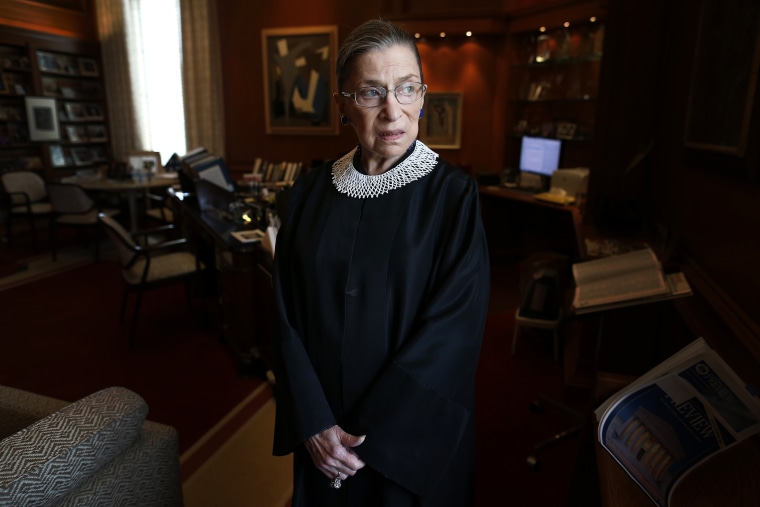Supreme Court Justice Ruth Bader Ginsburg is well aware of the progressive voices, urging her to step down from the high court. She's heard the arguments, but at least for now, she's not persuaded by them.
The 81-year-old still has no plans to retire, and in the interview [with Elle magazine], she dismissed calls for her to step down to make room for President Obama to pick her replacement as "misguided." "Who do you think President Obama could appoint at this very day, given the boundaries that we have? If I resign any time this year, he could not successfully appoint anyone I would like to see in the court," Ginsburg told writer Jessica Weisberg. "[The Senate Democrats] took off the filibuster for lower federal court appointments, but it remains for this court."
In the same interview, Ginsburg added, "So anybody who thinks that if I step down, Obama could appoint someone like me, they're misguided. As long as I can do the job full steam.... I think I'll recognize when the time comes that I can't any longer. But now I can.
There's apparently no real point in encouraging the justice to step down; Ginsburg will do what she believes is best. That said, the progressive jurist is clearly aware enough of the political circumstances to recognize the nuances of the so-called "nuclear option," and she's also cognizant of the broader electoral landscape, speculating last year about the 2016 elections.
"I think it's going to be another Democratic president," Ginsburg said last summer, adding, "The Democrats do fine in presidential elections; their problem is they can't get out the vote in the midterm elections."
But so long as she's going to present a defense for her ongoing tenure on the court, it's worth acknowledging the argument's very serious, almost alarming, flaws.
The pro-retirement pitch is pretty straightforward. Ginsburg is now 81, and has gone through two bouts with cancer. If she retires before 2016, President Obama will nominate a progressive successor; if Ginsburg leaves the bench between 2017 and 2020, and there's a Republican president, her replacement would almost certainly be a far-right jurist who would reject Ginsburg's views, values, and entire approach to the law.
In other words, by deferring retirement, the liberal Supreme Court justice is taking an enormous risk -- with the court's future, with the nation's future, with our future, and with her own legacy. Maybe when she decides it's time to step down, there will a Democratic president and Democratic Senate majority. Or maybe not. Ginsburg seems willing to gamble, even if it risks moving the already conservative Supreme Court even further to the right.
The anti-retirement pitch, on the other hand, is also pretty simple: the justice is still excellent at what she does and Ginsburg wants to keep doing that job well. For some of her admirers, nothing else, including the possible consequences, matters.
But note, Ginsburg's argument is more specific: she shouldn't step down, the justice said, because President Obama couldn't appoint "anyone I would like to see" to fill her vacancy. If Obama nominated a progressive champion, Ginsburg assumes, Republicans would simply block him or her through a filibuster.
The problem with this argument is, by Ginsburg's reasoning, she should never give up her seat, at least not until there's a progressive president working with 60 progressive senators.
Ginsburg is under the impression her successor wouldn't be as liberal as she is. That may very well be true. But if she waits until 2015 or 2016, the Senate will be more conservative and even less likely to approve a progressive justice. If she waits until 2017, the state of the Senate is volatile, but there may be a Republican president eager to nominate a younger version of Scalia.
If she'd said she just doesn't want to retire, and has no interest in political considerations, that would be a defensible approach. But Ginsburg is actually doing the opposite -- she's factoring in political conditions while weighing her future, but has decided the smart move is to place a remarkably risky bet.
Despite my deep respect and admiration for Ginsburg and her inspiring career, I find her approach extraordinarily reckless. For all of our sakes, here's hoping her gamble pays off.
